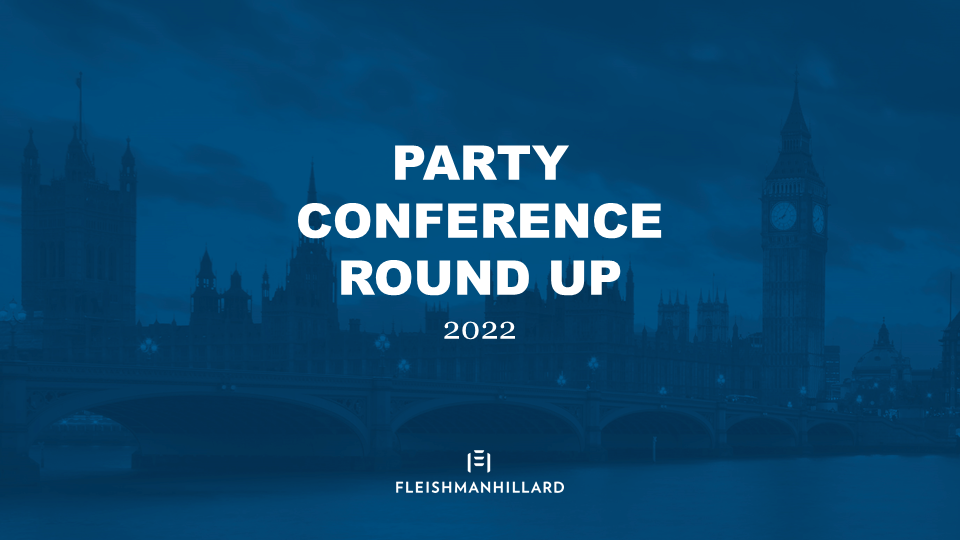The lady is for turning — Analysis of Conservative Party Conference and what comes next
Sophie Fischer, senior account executive
The atmosphere going into this Conference was a challenging one, with the Conservative Party clearly divided over the announcements in the mini-budget and the impact this had on the economy. As a first-time Conference goer, I had little reference point for comparing conference to conference. Rather, it was a case of ‘take it as I find it’. Having reflected on my time in Birmingham, I conclude that whilst I learnt a lot about Politics, I learnt very little about Policy.
Disunity within the Conservative Party was, and still is, evident to all; despite Truss’s claims that the U-turn on abolishing the 45p tax rate was because the contentious policy had become a distraction, the truth of the matter was that she could not get this policy through Parliament – attempting to do so would have resulted in a much larger political headache than simply scrapping it.
A trip to Birmingham
When the Tories arrived in Birmingham, the situation looked torrid for the Prime Minister. The atmosphere was undeniably flat, and the protestors dotted around the conference centre added to the general sense of despair, if not farce. This was a stark contrast to the air of optimism and hope delegates had felt at Labour Conference just seven days earlier.
The Government pushed forward their low intervention, low taxation, high growth message, but I am left questioning at what point does low Government regulation actually just mean low Government responsibility? I attended various events where it seemed clear that Ministers were looking to avoid taking the fall for failures across the board – given we are in our 12th year of Tory Governments, shifting the blame to the Labour Party is hardly plausible.
For example, when it came to levelling up, Minister’s Dehenna Davison and Paul Scully both stated that local governments need to be empowered to play a bigger role in shaping their communities. However, when it came down to the implementation of this, policy recommendations were nowhere to be seen. Even now, almost a week on, there have been no policy announcements to follow up. This has left businesses, local governments, and the general public with more questions than answers.
The Party themselves failed to show a united front, with some senior figures moving away from the Government’s centralised messaging, whilst others lacked credibility through no fault of their own. On Sunday evening, I attended an event where Dehenna Davison fought to defend the decision to abolish the 45p rate tax, only to be contradicted not twelve hours later when the U-turn took place.
That being said, throughout the four days, the Cabinet did not help itself. Transport Secretary Anne-Marie Trevelyan made her major announcement, during a week of train strikes, that she was committing £10 million to fix potholes, and Health Secretary Therese Coffey did not show up to her Health and Care Interview on Monday morning. The Party increasingly seemed oblivious to the real problems the public are facing.
What Next?
Now Conference season is over and Parliament is set to return tomorrow, it is clear that Truss needs to solve three major problems within her Party: communication, policy and political management. At the moment, she is still creating enemies, both within the Party – and even her own Cabinet – and outside with her criticism of the ‘anti-growth coalition’.
But it is not written in the stars for Labour just yet. At the end of the day, the Tories are still in power and the Labour Party haven’t been driving a strong narrative – it is important to remember that the polls are indicative of a Conservative loss, rather than a Labour win. Starmer is facing problems of his own, compounded by the fact that Labour have been positioned as part of the ‘anti-growth coalition’.
For now, it is clear that the backbenchers hold the initiative. If Truss is to reunite the Party, she needs backbenchers on her side and therefore will need to compromise on some major policy gridlocks – as we saw with the 45p tax U-turn.
So, what does this mean for business? Engaging with the wider political audience is key at the moment; the role of ‘decision makers’ now sits beyond the Cabinet and therefore engagement across the board is fundamental. Given the emphasis on growth, this is the time for businesses to demonstrate what they are doing to invest, upskill and deliver for the economy across the country.
The likelihood is that this political instability is going to get worse before it gets better and the probability of a general election before 2024 is ever-increasing. With disunity rife and Cabinet Members going off-piste during their Ministerial speeches, it is highly probable that this Conservative Party cannot sustainably function for the next two years. In the meantime, it will be interesting to see what Truss backtracks on next as if one thing has become clear over the past few weeks it is that the lady very much is for turning.
Find Out More
-
AI in the Newsroom
August 26, 2025



